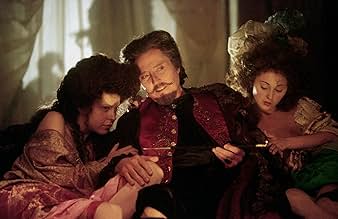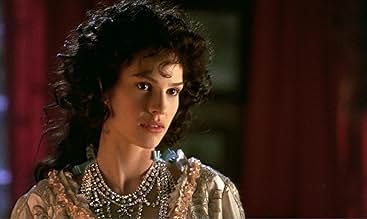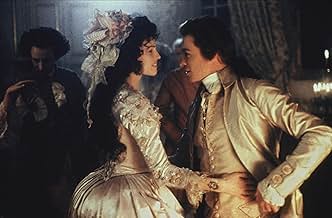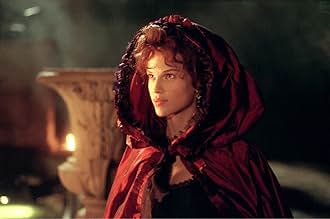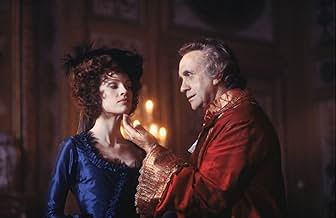PUNTUACIÓN EN IMDb
6,0/10
5,7 mil
TU PUNTUACIÓN
Jeanne de Valois llega a París: su padre fue asesinado por orden de Luis XVI en 1767, su madre murió al año siguiente, y su familia fue desposeída de títulos y tierras.Jeanne de Valois llega a París: su padre fue asesinado por orden de Luis XVI en 1767, su madre murió al año siguiente, y su familia fue desposeída de títulos y tierras.Jeanne de Valois llega a París: su padre fue asesinado por orden de Luis XVI en 1767, su madre murió al año siguiente, y su familia fue desposeída de títulos y tierras.
- Nominado para 1 premio Óscar
- 1 premio y 2 nominaciones en total
Reseñas destacadas
I have to disagree with just about every critic in the world. I completely love this movie. (No spoilers that wouldn't come from a preview or the back of the movie box included)
True, there is constant voice-over narriation. But this based-on-a-true-story-scandal movie involves a complicated plot. Without the help of one of our tried-and-true secondary characters. The historical characters, though obviously given modern color, are convincingly portrayed. Hilary Swank gives innocent looks as she lies shamelessly. As the plot thickens, so does the number of fun players. Christopher Walken seems to relish in his part of mystical cheater. Adrian Brody seems to really enjoy playing the philandering jerk, banging back whiskey and happily flirting with all young actresses (street-walkers) he sees. Jonathan Pryce actually made me fear him as the corrupt cardinal. Impressive from the man I last saw as the kindly father in Pirates of the Carribean.
The most lovable character, by far, is Retaux. The cheerful court-wise gigilo mutters some of the funniest lines in the movie, and runs a full gamut of emotions, from flirtatious to distraught.
Joely Richardson plays a WONDERFUL ultimately doomed by history queen. Her sweet naievety combined with indifferent ignorance paints a reasonably possible image of the French monarchy at the time.
Oh sure, the movie's not totally perfect. Really, there are two things that bothered me. (1) The all over the place accents. But I'm willing to forgive it. After all, the movie's set in France. They're not speaking French, so they're not going to fool me into thinking they're French anyway. (2) The sunglasses worn by Joely Richardson and Christopher Walken. Quite forgivable, but still made my eyebrows raise.
On the whole this movie exceeded my expectations tenfold. The great costumes, powerful music, and tense time period give the actors a playground where it's next to impossible to fall flat. But not a one of them would have anyway.
True, there is constant voice-over narriation. But this based-on-a-true-story-scandal movie involves a complicated plot. Without the help of one of our tried-and-true secondary characters. The historical characters, though obviously given modern color, are convincingly portrayed. Hilary Swank gives innocent looks as she lies shamelessly. As the plot thickens, so does the number of fun players. Christopher Walken seems to relish in his part of mystical cheater. Adrian Brody seems to really enjoy playing the philandering jerk, banging back whiskey and happily flirting with all young actresses (street-walkers) he sees. Jonathan Pryce actually made me fear him as the corrupt cardinal. Impressive from the man I last saw as the kindly father in Pirates of the Carribean.
The most lovable character, by far, is Retaux. The cheerful court-wise gigilo mutters some of the funniest lines in the movie, and runs a full gamut of emotions, from flirtatious to distraught.
Joely Richardson plays a WONDERFUL ultimately doomed by history queen. Her sweet naievety combined with indifferent ignorance paints a reasonably possible image of the French monarchy at the time.
Oh sure, the movie's not totally perfect. Really, there are two things that bothered me. (1) The all over the place accents. But I'm willing to forgive it. After all, the movie's set in France. They're not speaking French, so they're not going to fool me into thinking they're French anyway. (2) The sunglasses worn by Joely Richardson and Christopher Walken. Quite forgivable, but still made my eyebrows raise.
On the whole this movie exceeded my expectations tenfold. The great costumes, powerful music, and tense time period give the actors a playground where it's next to impossible to fall flat. But not a one of them would have anyway.
7dtb
Despite John Sweet's uneven script, this fact-based tale of intrigue and scams in Marie Antoinette's court is watchable thanks to sumptuous production values (Milena Canonero's gorgeous costume design garnered an Oscar nomination), scene-stealing performances by Christopher Walken and Adrien Brody (who even gets into some swordplay as the heroine's dissolute nobleman husband. Few people can make lechery and debauchery look as sexy and fun as Brody does here! :-), and good solid work from most of the rest of the cast. In this drastic change of pace from her Oscar-winning performance in BOYS DON'T CRY, Hilary Swank plays Jeanne St. Remy de Valois, who takes revenge on her father's death and her family's ruin by pulling a scam on Cardinal Jonathan Pryce involving an ornate diamond necklace designed for exiled Madame DuBarry and spurned by the Queen (Joely Richardson captures Marie Antoinette's self-absorbed naïveté while still managing to make me feel a little sorry for her, knowing she'd pay for her foolishness with her life). Swank's performance isn't bad, but it's not as assured as it should be, considering that Jeanne's plot turned out to be instrumental in spawning the French Revolution. Next to the rest of the sterling cast, which also includes Brian Cox and Simon Baker, Swank sometimes comes across as a little girl who's playing dress-up and feeling self-conscious about it. FTR, my fave line comes from Brody who, after being shot by Swank's lady-in-waiting during his swordfight with Baker, is having the bullet in his butt removed none-too-gently by a doctor: `Good God, are you digging for potatoes?!` :-)
The costumes are lavish, the sets lush and resplendent. The story is compelling: how a strange affair of court intrigue becomes part of a larger mosaic of incidences that will eventually bring down the French monarchy. As a backdrop to the main events of the film is the rising unrest of the French citizenry who are becoming more and more disillusioned with their monarchy. A couple of great actors, most notably Jonathan Pryce as Cardinal Rohan, stand out. And yet, although much of the film is there, it is not quite all there. Unfortunately for all its splendor, the final piece needed to make the movie a triumph is lacking: a leading lady right for the part. And maybe some adjustments in the music department.
First the positives: Despite a number of misgivings, this film still has the one element I always look for in any film: is the story compelling enough that, at any given moment, I care about what will happen next and it is not obvious what will happen next? And this movie definitely possesses the required attribute. Few movies have this rather simple facet, and yet, for me, it is often what will make or break a film regardless of the genre. Films as diverse as Star Wars: The Empire Strikes Back, Amadeus, and The Sting have the notable quality of being unpredictable until the very end. These last examples are of course masterpieces of film-making where Necklace is not. It's a good film with a good story but not one that will make any critics' lists.
The story of The Affair of the Necklace is extremely complex involving a countess, the Cardinal of France, the Queen of France, a gigolo, a sorcerer/psychic, a couple of jewelers, a peasant actress, forged letters, and a necklace of tremendous value and prestige. From the start, we know who did it, and the story back-tracks to tell us how and why the intrigue was perpetrated.
Now the not-so-good news: Hillary Swank, a 2-time academy-award-winning actress, is miscast for the part. The rest of the cast acclimates relatively well to late 18th-century France except for her. At times she seems to be playing a character more akin to an early 20th-century debutante than an 18th-century former member of the aristocracy. At times, some of her scenes appear contrived to provoke pity. The character is portrayed on the more innocent and vulnerable side of the female-character spectrum. This seems a bit hard to swallow as this woman is also a mastermind behind an intrigue that may have contributed to the downfall of the aristocracy. Maybe someone like Helena Bonham-Carter would have been a better choice...
The music is also inconsistent. For the majority of the movie, 18th-century and even 17th-century music is heard which seems appropriate as this is a period picture. I noticed a brief excerpt from the Monteverdi Vespers of 1610 in one of the church scenes. At other times, "original" music sounding a lot like Enya is played which always ruins my "disbelief". It reminds me we are in a movie made a couple of centuries after the events that are taking place. The filmmakers would have probably saved a lot of time and money by sticking to period music and not hiring a composer who writes new age music.
That said, this is still a good film when good films are uncommon. Perfect, not by a long shot. The script? Inconsistent but has its moments. Absorbing? Definitely. If you like period pictures, particularly those portraying pre-1800 Europe, you will still get a lot out of The Affair of the Necklace.
First the positives: Despite a number of misgivings, this film still has the one element I always look for in any film: is the story compelling enough that, at any given moment, I care about what will happen next and it is not obvious what will happen next? And this movie definitely possesses the required attribute. Few movies have this rather simple facet, and yet, for me, it is often what will make or break a film regardless of the genre. Films as diverse as Star Wars: The Empire Strikes Back, Amadeus, and The Sting have the notable quality of being unpredictable until the very end. These last examples are of course masterpieces of film-making where Necklace is not. It's a good film with a good story but not one that will make any critics' lists.
The story of The Affair of the Necklace is extremely complex involving a countess, the Cardinal of France, the Queen of France, a gigolo, a sorcerer/psychic, a couple of jewelers, a peasant actress, forged letters, and a necklace of tremendous value and prestige. From the start, we know who did it, and the story back-tracks to tell us how and why the intrigue was perpetrated.
Now the not-so-good news: Hillary Swank, a 2-time academy-award-winning actress, is miscast for the part. The rest of the cast acclimates relatively well to late 18th-century France except for her. At times she seems to be playing a character more akin to an early 20th-century debutante than an 18th-century former member of the aristocracy. At times, some of her scenes appear contrived to provoke pity. The character is portrayed on the more innocent and vulnerable side of the female-character spectrum. This seems a bit hard to swallow as this woman is also a mastermind behind an intrigue that may have contributed to the downfall of the aristocracy. Maybe someone like Helena Bonham-Carter would have been a better choice...
The music is also inconsistent. For the majority of the movie, 18th-century and even 17th-century music is heard which seems appropriate as this is a period picture. I noticed a brief excerpt from the Monteverdi Vespers of 1610 in one of the church scenes. At other times, "original" music sounding a lot like Enya is played which always ruins my "disbelief". It reminds me we are in a movie made a couple of centuries after the events that are taking place. The filmmakers would have probably saved a lot of time and money by sticking to period music and not hiring a composer who writes new age music.
That said, this is still a good film when good films are uncommon. Perfect, not by a long shot. The script? Inconsistent but has its moments. Absorbing? Definitely. If you like period pictures, particularly those portraying pre-1800 Europe, you will still get a lot out of The Affair of the Necklace.
This was a movie I had always had a slight interest in seeing and never gotten around to it, then I eventually forced myself to rent it and I must say I really did enjoy it. For all the history buffs this is not a movie for them, but if you really just sit down and watch without analyzing every detail it is very enjoyable. The plot is very interesting and interwoven and for the most part the cast does an excellent job. My only exception was unfortunately Hilary Swank. I have always loved Hilary Swank, but she didn't seem to have a clear understanding of what she wanted to portray with Jeanne. Jonathan Pryce was absolutely fantastic as the cardinal. He conveyed a danger that was very subtle yet frightening at the same time. The costumes were amazing, and I was very happy to see some scenes actually shot in "The Hall of Mirrors." Charles Shyer didn't blow me away with his directing style and some shots seemed uneven and out of place, but it was in no way distracting. Overall, it's a movie that doesn't necessarily require you to think very much, but it is still enjoyable. I'd recommend it for a lazy afternoon next chance you get.
This storylike true story had already been filmed by Marcel Lherbier in 1946,with Vivianne Romance -famous for her bitchy parts-,a more than adequate comtesse de la Motte.
This is the first mistake of this "remake":Hilary Swank portrays a genuine heroine,whose properties have been stolen by an unfair monarchy,whose father was some kind of Robin Hood who protected the poor against the cruelty of times.She appears most of the time as a victim,a noble adventuress,with a romantic love affair with her sidekick,but it's the ending in London that takes the biscuit,when she reads her memoirs to old posh sobbing ladies "oh poor thing!oh poor dear!" Les "memoires de madame de la Motte" -which were published in France during the revolution are obnoxious,trash stuff..Historian Jean Chalon quotes this line in that notorious book "the voluptuous princess -she's speaking of Marie-Antoinette- was waiting for me in her bed ,and I must say she took advantage of her husband's absence..."Actually Marie-Antoinette never met madame de la Motte and the scene under the snow when the queen accuses la comtesse of ruining the monarchy is pure fiction.
The scenarists are as naive as the cardinal de Rohan,and as the people of Paris in 1786,who thought Madame de la Motte's punishment was unfair.La Motte wouldn't stay long in la Salpetriere anyway,and some say she was helped to escape.As for cardinal de Rohan ,he was far from being a saint,but he was naiveté itself.how could he believe that Marie Antoinette ,who had always despised her and never spoke to him,could use him as an emissary?
The film is entertaining and a lot of scenes are more historically accurate -such as the grove of Venus and the trial:that's was the queen's mistake:the king did not need the parlament to judge somebody-. Walken is ideally cast as comte de Cagliostro ,as Brody as Nicolas de la Motte.But the Queen's execution (1793) comes at the most awkward moment ,and La Motte was dead (in 1791) when it occurred anyway.The scenarists suggest her death might have been a crime :never an earnest French historian made a hint at that.At the time,the royal family had more important problems to solve .
The scenarists say that the affair of the necklace was the direct cause for the French revolution,which is a narrow-minded view.It might have been the straw that broke the camel's back but the reasons were much more complex and the students should take a better look at it.
The movie does not tell that after his exile,Rohan was restored to favor during the revolution ,became part of the Etats-Généraux" in 1789 ,and died in Germany in 1803,the last of the dramatis personae
This is the first mistake of this "remake":Hilary Swank portrays a genuine heroine,whose properties have been stolen by an unfair monarchy,whose father was some kind of Robin Hood who protected the poor against the cruelty of times.She appears most of the time as a victim,a noble adventuress,with a romantic love affair with her sidekick,but it's the ending in London that takes the biscuit,when she reads her memoirs to old posh sobbing ladies "oh poor thing!oh poor dear!" Les "memoires de madame de la Motte" -which were published in France during the revolution are obnoxious,trash stuff..Historian Jean Chalon quotes this line in that notorious book "the voluptuous princess -she's speaking of Marie-Antoinette- was waiting for me in her bed ,and I must say she took advantage of her husband's absence..."Actually Marie-Antoinette never met madame de la Motte and the scene under the snow when the queen accuses la comtesse of ruining the monarchy is pure fiction.
The scenarists are as naive as the cardinal de Rohan,and as the people of Paris in 1786,who thought Madame de la Motte's punishment was unfair.La Motte wouldn't stay long in la Salpetriere anyway,and some say she was helped to escape.As for cardinal de Rohan ,he was far from being a saint,but he was naiveté itself.how could he believe that Marie Antoinette ,who had always despised her and never spoke to him,could use him as an emissary?
The film is entertaining and a lot of scenes are more historically accurate -such as the grove of Venus and the trial:that's was the queen's mistake:the king did not need the parlament to judge somebody-. Walken is ideally cast as comte de Cagliostro ,as Brody as Nicolas de la Motte.But the Queen's execution (1793) comes at the most awkward moment ,and La Motte was dead (in 1791) when it occurred anyway.The scenarists suggest her death might have been a crime :never an earnest French historian made a hint at that.At the time,the royal family had more important problems to solve .
The scenarists say that the affair of the necklace was the direct cause for the French revolution,which is a narrow-minded view.It might have been the straw that broke the camel's back but the reasons were much more complex and the students should take a better look at it.
The movie does not tell that after his exile,Rohan was restored to favor during the revolution ,became part of the Etats-Généraux" in 1789 ,and died in Germany in 1803,the last of the dramatis personae
¿Sabías que...?
- CuriosidadesThe film cast includes three Oscar winners: Hilary Swank, Christopher Walken, and Adrien Brody; and one Oscar nominee: Jonathan Pryce.
- Citas
Jeanne St. Remy de Valois: It is my family's home I wished returned.
Minister of Titles: That will never be tolerated!
- ConexionesFeatured in Siskel & Ebert & the Movies: American Film Festival (2001)
- Banda sonoraMovement I: Mercy
Written by Alanis Morissette & Jonathan Elias
Performed by Alanis Morissette & Salif Keïta
Courtesy of Sony Classical, A Division of Sony Music Entertainment, Inc.
Selecciones populares
Inicia sesión para calificar y añadir a tu lista para recibir recomendaciones personalizadas
- How long is The Affair of the Necklace?Con tecnología de Alexa
Detalles
- Fecha de lanzamiento
- País de origen
- Sitios oficiales
- Idioma
- Títulos en diferentes países
- The Affair of the Necklace
- Localizaciones del rodaje
- Empresa productora
- Ver más compañías en los créditos en IMDbPro
Taquilla
- Presupuesto
- 30.000.000 US$ (estimación)
- Recaudación en Estados Unidos y Canadá
- 471.210 US$
- Fin de semana de estreno en EE. UU. y Canadá
- 125.523 US$
- 2 dic 2001
- Recaudación en todo el mundo
- 1.198.113 US$
- Duración1 hora 58 minutos
- Mezcla de sonido
- Relación de aspecto
- 2.35 : 1
Contribuir a esta página
Sugerir un cambio o añadir el contenido que falta

Principal laguna de datos
What is the Mexican Spanish language plot outline for El misterio del collar (2001)?
Responde






